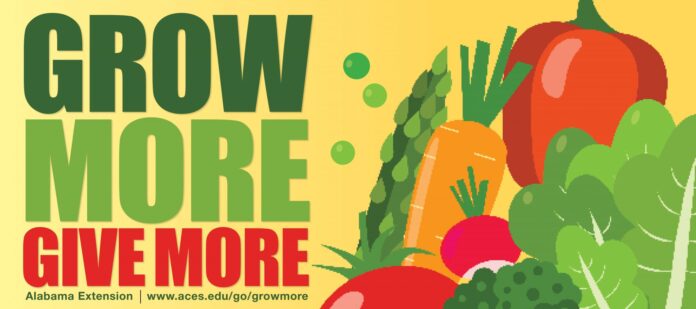
AUBURN UNIVERSITY, Ala. – Growing and harvesting your own vegetables is a fulfilling process not only for gardeners and families, but also for communities. With proper tending and care, vegetable gardens can provide a wealth of freshly grown produce.
With Alabama Extension’s Grow More, Give More project, both experienced and novice gardeners can receive invaluable information and resources for a successful harvest.
“This project started as a direct response to the COVID-19 pandemic,” said Alabama Extension Agent Bethany O’Rear. “When our state shut down in March, we began receiving calls from people who had never grown a vegetable garden before and were looking to get started.”
This initiative enhances vegetable garden harvests, and it also encourages gardeners to grow extra to give back to their communities. O’Rear hopes to expand community-based gardening as a way to increase donations of healthy vegetables across Alabama.
Grow more
To help you grow more, Alabama Extension has abundant resources to boost an individual’s growing potential. Whether the veggies are growing in raised beds, containers or traditional in-ground, Alabama Extension has resources for your garden.
O’Rear encourages first-time and seasoned gardeners to use these supply lists to get started growing more.
- Five Gallon Bucket Supply List (www.aces.edu/blog/topics/lawn-garden/five-gallon-bucket-supply-list)
- Garden Box Supply List (www.aces.edu/blog/topics/lawn-garden/garden-box-supply-list)
- Raised Bed Supply List (www.aces.edu/blog/topics/lawn-garden/raised-bed-supply-list)
- 10’ x 10’ Garden Plot Supply List (www.aces.edu/blog/topics/lawn-garden/10-x-10-garden-plot-supply-list)
To view the Alabama Extension’s library of gardening materials, visit these links. These will help both new and veteran gardeners have a successful garden harvest.
- Alabama Vegetable Gardener (www.aces.edu/blog/topics/vegetables-lawn-garden/the-alabama-vegetable-gardener)
- Planting Guide for Home Gardening in Alabama (www.aces.edu/blog/topics/lawn-garden/planting-guide-for-home-gardening-in-alabama)
- Raised Bed Gardening (www.aces.edu/blog/topics/lawn-garden/raised-bed-gardening)
- Basics of Fall Vegetable Gardening (www.aces.edu/blog/topics/vegetables-lawn-garden/basics-of-fall-vegetable-gardening)
- Growing Lettuce in Spring or Fall (www.aces.edu/blog/topics/lawn-garden/growing-lettuce-in-spring-or-fall)
By growing an extra row of vegetables in the garden, gardeners can provide food security to citizens across the state. Visit the Alabama Extension website for a comprehensive list of additional Grow More, Give More resources.
Grow more, give more videos
To guide gardeners through selecting a location, installing irrigation, harvesting or preserving crops, Extension professionals have created more than 25 informative videos.
“We developed Grow More educational pieces–videos, supply lists, digital resources and webinars to be as straightforward as possible,” O’Rear said.
These videos are available on the Grow More, Give More Videos page at www.aces.edu/blog/topics/lawn-garden/grow-more-give-more-videos.
Give more
No matter where in the state it originates, every produce donation is valuable. Here is how to participate:
- Consider dropping off extra vegetables to homebound neighbors. Whether individuals are homebound from age, financial limitations, COVID-19 or other illnesses, fresh produce is a perfect gesture of appreciation.
- Schools, community centers and places of worship are constantly addressing food insecurity. Reach out to those in your area to see if there is a need for fresh produce.
- Statewide charities such as Society of St. Andrew, a crop gleaning charity, and regional food banks across Alabama will coordinate donations, especially in larger quantities.
“We reported over 28,800 pounds of donated produce in 2020, helping more than 5,767 families,” she said. “A total of 33 communities donated and 84 percent of gardeners used Extension resources.”
Participants can document the pounds of food donated by completing a brief online survey at http://bit.ly/3avuKEK. Also, make sure to submit photos of donations and use the hashtag #growmoregivemore on the Alabama Smart Yards Facebook Page. O’Rear said she hopes to continue highlighting the generosity of Alabama gardeners through this project.
“In 2021, we hope to work with local Grow More Give More ambassadors in a growing list of Alabama counties to continue to push the project out,” O’Rear said.
More information
By growing more and giving a little extra, Alabamians can alleviate food insecurity and spread generosity throughout their communities.
For more information on the Grow More, Give More project, visit the Alabama Extension website, www.aces.edu/go/growmore, or send an email to GMGMhelpline@aces.edu.




























